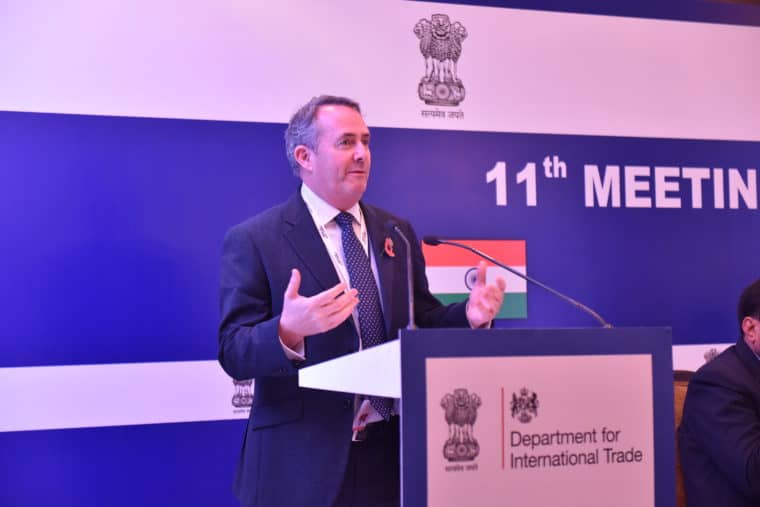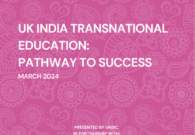UK Secretary of State for International Trade speech to JETCO
UK Secretary of State for International Trade, Liam Fox co-chaired the 11th edition of the UK- India Joint Economic and Trade Committee, along with Nirmala Sitharaman, Indian Minister for Commerce and Industry on 7 November 2016

Liam Fox addressing the 11th JETCO meeting
Thank you Your Excellency Minister Sitharaman, distinguished speakers, ladies and gentlemen.
I am delighted to be back in India for the second time within three months in my new capacity as Secretary of State for International Trade.
I am also extremely grateful to have this opportunity to be talking to you all today.
Since the last UK-India JETCO in 2015, the UK Department for International Trade has been established, to lead on trade and investment policy and to promote Britain around the world.
It naturally assumes responsibility for trade and investment Dialogues such as JETCO.
My Department was created immediately after UK Prime Minister, Theresa May, took office.
And, unless you’ve been on another planet for the last six months, you will know that this happened following the historic decision of the British people to leave the European Union.
Yet this was not a vote for insularity, and the United Kingdom will not be turning in on itself.
We will be an open, outward-looking nation.
We have not yet triggered Article 50, a two-year process, and until we leave we will continue to be a strong voice within the EU for free and open trade, including supporting EU ties with India.
The process of disengaging from the European Union will not be without its challenges. But I am confident that it represents a fantastic opportunity for Britain – and for India.
For our two countries now have a golden opportunity to re-forge our trading relationship.
Britain and India may be geographically far apart, but we are close commercial partners, bound by ties of history, law and language we have a common understanding that trade and investment creates economic growth and prosperity for our citizens.
The vote to leave the European Union has created a more, outward facing United Kingdom.
This has gifted us an opportunity, and incentive, for renewed engagement with the world’s fastest growing economies, foremost among them India.
The task of my Department is to make Britain the global champion of Free Trade, working with our most important partners to remove barriers and promote commerce across the world.
We are ensuring that the protectionist sentiment which has been on the rise across the world in recent times is challenged directly, and the principles of free trade upheld. Seizing on opportunities to strengthen our economic and political ties with our closest economic allies, will ensure that working with India is at the top of the Government’s priorities.
We intend on maintaining a close relationship between our countries, one of our most important long-term goals.
This is why I have personally chosen to Co-Chair the UK-India JETCO.
I want to build on areas of existing strength, tackle the challenges we face in unlocking future potential, and forge brand new areas for cooperation in the Twenty First Century – a Century in which India and her economy have already taken a key place on the world stage.
India and the United Kingdom already share a strong economic and commercial partnership.
In recent years, the growth in the UK’s merchandise trade with India has far outperformed that of the ‘EU three’ of France, Germany and Italy.
Last financial year, Indian imports from those three countries fell substantially, whilst those from the UK registered an impressive 3.4% growth.
UK firms currently employ nearly seven hundred thousand people in India and, as the G20’s largest investor in India; we contribute around 8% of India’s foreign direct investment.
Our companies, capital, services and technology are natural partners for the ‘Make in India’ scheme, and for your ambitious plans for the growth of smart cities.
As Secretary of State for International Trade, I place huge value upon the United Kingdom’s close relationship with India.
Your country is the third largest foreign investor into the UK economy, and our mutual investments build a trusting commercial relationship that benefits millions of our citizens.
But the relationship between the UK and India could be stronger still.
Earlier today, I met with Minister Sitharaman to discuss ways in which we can strengthen our relationship.
I am delighted that we formally established a Joint Working Group on Trade [& Investment] which will enable regular and ongoing dialogue between our Officials, with the aim of broadening and deepening our relationship.
Before the next JETCO, we must have completed a full audit, identifying the impediments and barriers to trade that still exist between our two countries.
This will include empirical data, and will enable us to focus on outcomes and choose the path that will deliver for Britain and India.
I also had the pleasure of participating in the CEO Forum where I will return later today, I urged the Members to engage with the JETCO and other business and Ministerial dialogues.
I want to see government and business working together in close collaboration to enhance the prosperity of our two great nations.
By working together, we can create a predictable and stable business and regulatory environment for investors, promoting growth across our economies.
To achieve this, I envisage a future of Anglo-Indian cooperation not only internationally, but at key-sector level, working together to create the most business-friendly environment possible.
There are industries in which the United Kingdom is particularly strong and has the potential to greatly benefit the growing Indian economy.
Sectors such as Technology – the theme of this sensational summit –infrastructure and smart cities, manufacturing and engineering are all key themes within this JETCO.
The United Kingdom is, for example, home to some of the largest and most innovative Tech companies on the earth.
Technology is one of the largest wealth creators in the UK, adding some £87 billion to the economy annually.
There are over 1.3 million professionals working across a range of tech sectors.
For the giants of Silicon Valley, such as Google and Facebook, we are home to the largest engineering and development labs outside the United States.
Companies such as Lycamobile are at the forefront of the telecoms revolution; many Indians living in the UK use their innovative service every day to call home.
India is an ambitious world-leader in smart cities, and the UK is already well placed to realise your ‘Smart Cities Vision’.
Using intelligent technology to enhance quality of life in urban environments, UK companies have experience in delivering world class solutions to benefit cities throughout India.
British companies are already global leaders in Design and Planning, Construction and Transport, and have helped to design eco-friendly smart cities in China and the Middle East.
Tomorrow I will be in Pune to lead the UK Smart Cities Delegation in a dialogue on the role UK companies can play in helping to deliver their Smart City programme.
In manufacturing, India and the UK have already formed a world-beating partnership.
Our joint aerospace industry in particular, goes from strength to strength, and is a prime example of what an Anglo-Indian commercial alliance can produce.
Whilst the Education & Skills Working Group has been discontinued, there is still a lot which our two countries can do together in this space.
Far from losing focus on this important area, the Minister and I agreed that Education and Skills should become a key point for future collaboration.
As an example of how businesses can make tangible progress in this area, ten UK companies are committing to actively support the Government of India’s ‘Make in India’ and ‘Skill India’ initiatives through a ‘Skills Pledge’.
The areas of skills being covered are: apprenticeships; career development; technical and leadership training; and certification support.
These collaborative efforts will provide access to international-standards of education and training for the Indian workforce.
We will hear more about these and on-going collaborations between our businesses in these vital areas when the Co-Chairs of the Working Groups update us.
Trade and investment drives economic development and growth and leads to shared prosperity.
That is why opportunities for Government and Business to work together through forums such as JETCO are so vital.
We have seen how successfully our industries collaborate, and we have seen how already our countries have invested heavily in one another.
The United Kingdom is the natural partner for Make in India; and I want Make in India to become synonymous with Finance in the UK.
I want to finish today with a few calls-to-action:
Firstly, I want each and every person sat in this room to search out opportunities for collaboration with those around them.
We have some of the world’s most innovative companies represented here; a clear demonstration of the calibre of our business community and of the potential that is, quite literally, all around us.
Secondly, if you have an idea or an opportunity which can enhance commercial collaboration and lead to mutual prosperity, talk to Ministers, Officials, the JETCO Co-Chairs, the CEO Forum… Anyone and everyone!
Our Governments are listening.
We have tools such as the Prosperity Fund at our disposal, to support projects which result in mutual economic development.
For obvious reasons, we cannot seed fund every business venture. However, through bilateral dialogues such as JETCO, we can discuss ways of improving the business environment, making it more likely for ideas to succeed.
As Britain turns to face the world, our cherished relationship with India will become more important than ever before.
This is a chance to turn our shared values and foundations into structures that will build future prosperity.
This is the time to take a chance.







